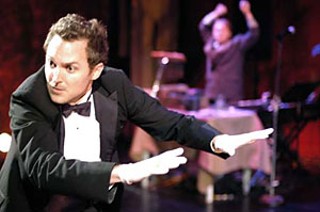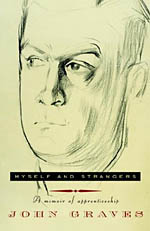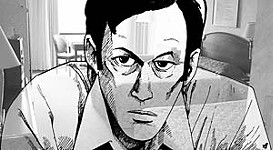Payback as Comeback
The Rudes boost a resurgence with 'Decameron Day 7: REVENGE!'
By Steve Moore, Fri., April 14, 2006

Sometimes you name your child Alice, and she grows up to be an Annabel. Or Felicia and he becomes a Fernando. The Rude Mechs called their new show Decameron Day 7: REVENGE! – but the play grew up to be something else.
I visited a rehearsal and realized pretty quickly that while there's still plenty of revenge in the show, there's almost no Decameron, and it never matters what day it is. Instead, there are stretches of real soap opera and bits of Hamlet. There are ghosts and tango dancing. There's Boba Fett and a counterfeit priest. The collection of elements is so motley that it can seem willfully random. It isn't. What's astonishing about this show is how well the Rudes combine and marry those elements into something so tight and whole. Revenge is the spine of the play, and the show comes at the idea of revenge from every angle. Characters in the soap opera take revenge upon each other. We hear that, long ago, a ghost that haunts the theatre building revenged himself on an innocent boy. At several points, the actors give the audience detailed information for getting revenge on their own enemies. Even spontaneous tango dancing becomes a code for impending vendettas.
It was a week before opening, and some things were still being decided: Should Massimo have his Italian accent in his metascene with Dr. Ridge? Should the Boba Fett love song come before or after Heather's monologue about mail-tampering? And what about the end? Does it need an overhaul? At the Wednesday rehearsal, the decisions were little and big. Director Shawn Sides was puzzling over nuances of choreography while playwright Kirk Lynn was churning out revisions and new scenes.

This was the last-minute work of a process that's been going on for eight months with a huge and all-star bunch of people: Lowell Bartholomee, Madge Darlington, Robert S. Fisher, Thomas Graves, Heather Hannah, Lana Lesley, Jason Liebrecht, Michael Mergen, Leilah Stewart, Lynn, and Sides – actors, designers, a writer, and a director. Work started as a casual exploration: The group made dinner and watched Pasolini's Il Decameron on VHS. (The consensus: It sucks.) They read chunks of Boccaccio's Decameron itself and scenes that Kirk had adapted from those chunks. They brainstormed structures and ways to work: Should it be a hundred scenes like the Decameron? What if 10 people each independently curated 10 scenes? Should it be inspired by dinner theatre? (They all went to the Renaissance-style Madrigal Dinner at UT; there was a jester.) Did it matter that the stories in the Decameron were mostly tedious pap about happy or unhappy love and the recovery of lost objects?
The Rudes have said that the most important thing to figure out when they're creating a show from scratch is the mode, the style and mannerisms that infuse the action. The things people say and do is much easier to work out once you know what world you're fitting things into. The madrigal approach wasn't going to work, so Shawn suggested soap operas – which, as she pointed out, are all about revenge.
And so they were off and running. They started watching hours of daytime TV and downloading transcripts of soaps from the Web. (The Bold and the Beautiful was a particular favorite.) Lynn wrote, stole, and rewrote scenes, and then the group found ways to refract them with video and dance. With that in place, other things could come into play: ghost stories, Boba Fett, and practical suggestions for revenge. Revenge, revenge, revenge.
But more than the revenge, the show is fascinating for the way it continuously reinvents itself on stage. True to the Rude Mechs style, it makes a game of exposing itself and its mechanisms to the audience in surprising and generous ways: Actors perform a scene live onstage as the same scene is silently projected behind them on a giant screen. Or they perform a melodramatic scene that they perform again later with the same gestures – but with dialogue delivered in the third person. (Dr. Ridge: "If we can't be loyal to each other, Dr. Ridge suggested, we could at least be loyal to the stories in which we found ourselves.") This could all seem like metatheatrical hand-waving if it weren't for two things: 1) It's enormously fun. 2) It has a fascinating rationale.

The Rude Mechs want their plays to be inclusive, and they want them to be egalitarian. The spirit of inclusion contributes to the content: Match-Play juxtaposed bleach blond hair, a talking cow, and riddles in phenomenology. With Cherrywood, it was werewolves, youth revolution, and a magic pizza box. And before that over their 10-year history: electrocuted elephants, country karaoke, Dada suicide, donkey costumes, Snow White, and a hundred other odds and ends.
The spirit of egalitarianism contributes to the style: As the Rudes say in their mission statement, "We strive to make plays in which no element holds authority over any other." The shows are collaborations not only among people but among content, style, theme, and character, none of which is allowed to out-shout the others. The plays therefore progress by flashes and shifts that interrupt the action. These aren't Brecht's pedantic interruptions to keep the audience from slipping into belief; for the Rudes, the interruptions are interrupting other interruptions. The upshot is that preference and prejudice – let alone belief – barely have a chance to take hold.
In a world where we interact more with information than with real objects, our preferences can be a mental plaque. Rude Mechs shows are contained derangements designed to chip that plaque away. Besides the sudden shifts, the shows frequently pose mischievous questions of what-if and why-not. Often characters play games with elaborate and shifting rules. And over and over, the shows draw attention to artifice: not only the artifice of the theatre, but the artifice of knowledge and objectivity. All of this goes toward reminding us of fresh possibilities – specifically the possibilities that are obscured when a big thing or big idea dominates a little one.
In fact it's this same egalitarianism that defines the theatre group itself, a five-person collective devoted to collaborative decision-making at all levels. No member is senior to any other. Roles are often shared or swapped. Each member seems to have a standing invitation to deflate the egos of the others when necessary. And as with the shows, the company even seems game to completely reinvent itself: A couple of years ago, they were seriously considering putting the whole company on hold for two years while each member learned to paint.

You can start to wonder whether the Rude Mechs is not a theatre company so much as a whole utopian endeavor and that the shows are glimpses of that endeavor through a kaleidoscope. Maybe you could say that all theatre has a utopian aim, but for these guys that aim is both more clear and more arcane. It's clear in the communal structures they endorse onstage and off, but it's arcane because its goals are more about an internal, mental rearrangement than about any kind of change to the mechanics of the world itself.
It's not that the shows tell us not to change the world, but mostly they want us to change the way we perceive things. They make us wonder whether some new and different point of view might work better as a way of absorbing or creating information. The Rudes make what Arthur Danto calls "disturbatory art" – art designed to modify the consciousness, the structure of thoughts. And even if the proposals in the Rudes' shows are outlandish – and they usually are, on purpose – the pleasure comes from taking them at face value and skidding off our mental rails for as long as we can stand it.
That's the general proposal. What makes their individual plays more or less successful is whether the audience takes that proposal as a gift or as a challenge. As one character said in the recent Match-Play: "You can either stop trying to figure it out or you can concentrate harder." The line could be intended as a guilt-free escape for audience members who don't feel like having their brains massaged. But it can also sound like a put-down, a way of saying that it's too bad for us in the audience if we're not smart enough to pick up what the Rudes are laying down.
We'd have an easier time if we knew more about the artists that the Rudes have looked to for inspiration. Not just the Dadaists, the Futurists, and punks, but contemporary New York theatremakers like the SITI Company, the Wooster Group, and Richard Foreman. The Rudes have studied the work that these folks do and adapted their methods in fascinating ways. If the whole world lived in New York, it would be obvious that the Rudes are in an ongoing conversation with these groups, but when the Rudes are the only folks we see talking through microphones to the audience or inserting beautiful dances into their plays or creating intricate interactions with video, they can seem willfully eccentric. Taken in the national context, you realize that the Rudes are pioneers, yes, but with attention to a particular, contemporary tradition.

But even having that context is no guarantee that an audience will dive into the shows that the Rudes make. Whether they do depends on a variety of things. Partly it depends on how funny the show is. Partly it's how much of the show's clockwork we get to see from the audience. And partly it's whether the shows channel the innate generosity, curiosity, and mischief of the Rudes themselves. REVENGE! manages to do all three of these things almost perfectly. In fact, REVENGE! is the latest play in a yearlong artistic rally for the Rudes, starting with Cherrywood and including Get Your War On and Match-Play, each of which opened itself to audiences in some new way.
A previous rally crested in the spring of 2002 with the beautiful El Paraiso – after which the company went into a slump with The Incubus Archives (2002); a lesser remount of Requiem for Tesla (2003); How Late It Was, How Late (2003); and Stadium Devildare (2004). More than anything, what these shows had in common was a lack of Rudeness. Two were written by non-Rudes, and the two homegrown scripts seemed so reverent of their subjects that the Rudes' native style got pushed to the sidelines.
But Cherrywood and the great shows that have come since aren't just returns to old forms. It's true they seem inspired in different ways by benchmark shows like Curst & Shrewd (1997) and Lipstick Traces (1999), but with these recent shows the Rudes are up to something new – something fairly simple: The shows are happier.
Here's a stage direction from REVENGE!: "Then everyone begins dancing. How fabulous is all the turning? What in-jokes are hidden in the little gestures? The real favor we've done the audience is having fun. If any of us wants to smile, we're gonna smile, and it'll be real. When we're done, we're gonna smile our asses right up off the stage and let the ghost of what's going to happen next enter the room."

It's not a dumb or sentimental happiness. And it's not about taking delight in being clever or in the know. It's grown-up and big-hearted. Most of the time it's much quieter than this stage direction suggests, but it's definitely there. The plays are as raucous and as demanding as ever. (Match-Play is probably more outlandish than anything the Rudes have ever done.) So they've held on to their credibility and even extended it, but at the same time, they've made the shows less defiant and more spacious.
That change is just one aspect of the Rudes' superhuman ability to grow and adapt. Now in their 10th year, the company has evolved from a group of Winedale friends into a powerhouse arts organization with five co-producing artistic directors, 19 additional company members, a 5,000-square-foot performance venue, a 7,000-person mailing list, and an annual budget of $200,000 – including funding from the National Endowment for the Arts and the Rockefeller Foundation. They've mounted more than 30 shows, toured national and internationally, and garnered scores of awards.
People familiar with running a theatre company rightly marvel not only at their achievements, but at the fact that they do all this as a true collective. Ninety percent of making theatre is thankless drudgery involving budgets, publicity, grant-writing, and schmoozing. And if you manage a venue which you rent to other groups, the extra drudgery includes: contracts, lost keys, broken equipment, and cleaning the bathrooms. That would all be easier to swallow if you were well compensated, but the five co-artistic directors each earn about $15,000 per year – and they work well over 50 hours per week. And that's just the practical side. On the creative side, you have five willful artists trying to work together to make theatre from scratch, and every one of them has strong opinions about writing, directing, acting, and design.
It's a recipe for collapse. But by some combination of co-reliance, scouring honesty, and compromise, it survives. It also survives because the members have such deep faith in one another and in the work they're trying to do. They recognize that their shows are amplifying the thoughtfulness of their audiences. And by now they must be addicted to the work itself, especially the work of collaboration, which for all its pleasures must inevitably expose in all kinds of fixations and neuroses. But then again those are the kinds of thing that people like the Rudes actually enjoy grappling with. As Lynn writes: "Our collaboration is an expansive act. We're each made better for knowing what compromises we can make as well as what requirements we demand. Working collaboratively also has a sifting effect – the most vital ideas and opinions survive."
A case in point is the end of REVENGE!: A lot of different ideas were in the running: a toast, a litany of regrets, a fire in a bowl to burn away vengeful urges. The compromise: It ends with the list itself of all the ideas for endings, the list of how it might have ended if there were more money and more time. By saying the things they wanted it to be, they give us all those things and more. It's a moment of magic, mental gymnastics, and generosity all in one – a Rude Mechanicals specialty.
Decameron Day 7: REVENGE! runs through April 29, Thursday-Saturday, 8pm, at the Off Center, 2211-A Hidalgo. For more information, call 476-RUDE or visit www.rudemechs.com
.








